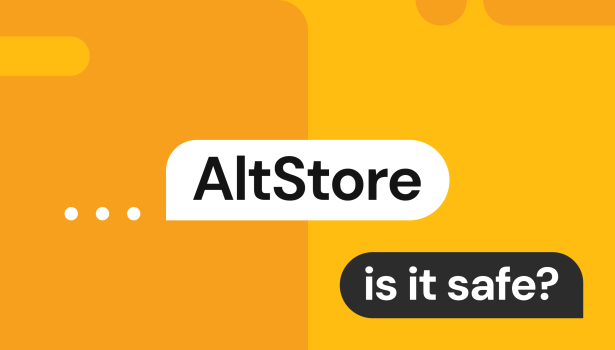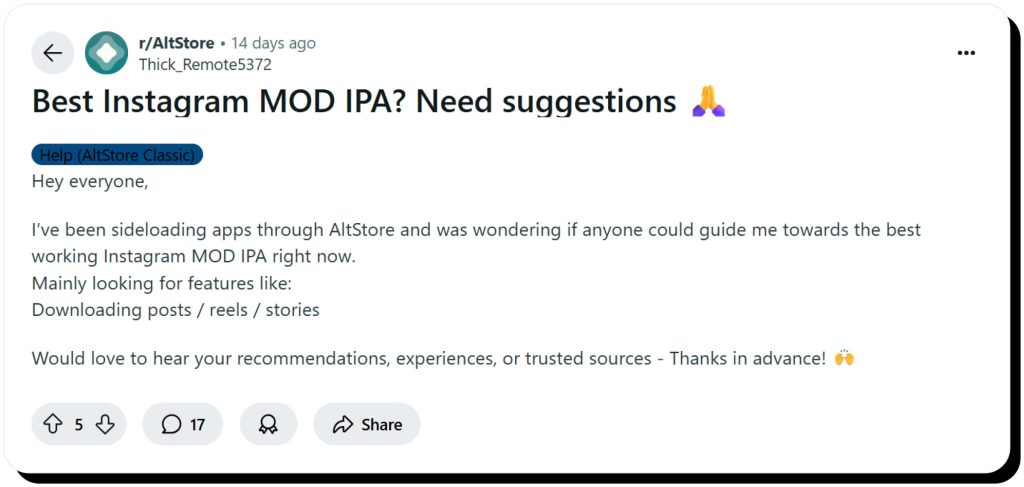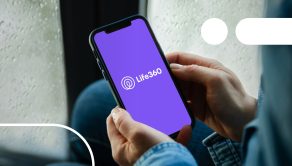Is AltStore safe? What iPhone users need to know in 2025

AltStore is generally considered safe, especially if compared to jailbreaking because it doesn’t modify iOS or bypass Apple’s core security protections. It’s an open-source project created by a respected developer, which means the code can be reviewed for transparency and absence of hidden malware or trackers. Apps installed through AltStore are signed using Apple’s provisioning system, so your device remains intact and continues receiving normal software updates.
That said, apps on AltStore aren’t reviewed by Apple so the responsibility for checking their safety falls on the user. There’s also the hassle of re-signing apps every seven days with a free Apple ID, and occasional certificate revocations that stop apps from working until refreshed.
What is AltStore?
AltStore is a sideloading platform that was started in 2019 by an independent developer. If you are unfamiliar with sideloading, it’s a way of downloading apps that aren’t available on the official App Store—like video game emulators or modified versions of popular apps.
While sideloading has been relatively easy on Android devices for a while, AltStore is one of the first user-friendly sideloading platforms available on iPhones.
To access AltStore, users first need to install a companion app called AltServer on a desktop computer (it’s available for Windows as well). Then, they need to connect their iPhone/ iPad via a USB cord or Wi-Fi. AltServer installs the AltStore app on the device by taking advantage of Apple’s developer provisioning system (this allows apps to be signed and run without App Store approval). From there, users can download third-party apps in .ipa file format.
However, there’s a limitation: free Apple IDs only allow three active sideloaded apps at a time and require re-signing every seven days. Some ways to extend access include:
- Purchasing a paid $99/year developer membership, which grants a full year of access to the software.
- Refreshing apps every 7 days (can be done manually or set to automatic).
Is AltStore legit?
AltStore is indeed a legitimate platform developed by Riley Testut, who was already respected in the community after creating popular emulators for Game Boy Advance and Nintendo.
AltStore also has an open-source code, which helps independent professionals and ordinary users review it to make sure there’s no malicious code, trackers, or data collection mechanisms hidden. Additionally, it helps lessen the risk of security breaches through community audits and contributing improvements.
However, despite having a good reputation amongst users, legitimacy doesn’t equal legality.
In the past, the most common way to skirt Apple’s strict rules against unofficial apps was by jailbreaking—removing built-in security restrictions from a device. Now, AltStore provides an easier process that doesn’t put your device’s integrity at risk—but both methods are against Apple’s Terms of Service.
Using AltStore bypasses the App Store’s official distribution and review system. Apple’s rules require all iOS apps to go through its App Store approval process that checks them for security, privacy, and compliance. AltStore instead uses Apple’s developer provisioning system—intended only for app testing—to sideload apps directly onto devices. This circumvents Apple’s restrictions, allows apps that wouldn’t normally be approved (like emulators), and lessens Apple’s control over its ecosystem.

So far, there haven’t been any cases of Apple penalizing for using AltStore. The platform is also openly available online and hasn’t faced any legal action from Apple either. The most likely worst-case scenario is that the sideloaded apps stop working when their certificates expire, requiring you to refresh or reinstall them.
Is AltStore safe to use?
AltStore itself is considered a safe platform. It relies on open-source code which is regularly updated to address possible bugs and reviewed by the community for potential vulnerabilities.
Other reasons why AltStore is considered safe to use include:
- Apps are installed under Apple’s provisioning system. This is the same system Apple provides to developers for testing their own apps before App Store release. This also ensures that apps are constrained by iOS’s built-in security rules and are less likely to compromise system files, access other apps’ data, or cause permanent damage to your device.
- Device integrity isn’t compromised since there is no jailbreaking. You won’t have to forfeit software updates, warranties, or the operating power of your device. Your warranty stays intact and you maintain normal device performance without exposing the system to deeper vulnerabilities.
- AltStore collects and shares relatively minimal personal data. Using the platform doesn’t require creating an account—login details are entered directly into Apple’s systems for app signing.
However, it’s important to understand the difference between AltStore’s safety and the safety of individual apps—the latter isn’t guaranteed. The sideloaded apps don’t go through Apple’s review or vetting process, meaning their quality, privacy practices, and security can vary depending on the developer. While most are safe, others could request invasive permissions or even contain malware. For this reason, users should always research the app source, check community feedback, and avoid downloading from unknown or suspicious developers.

Risks and considerations
There are a few possible security risks when downloading software that is not from the official App Store. Before using AltStore, you should be aware of the following potential issues:
- Revoked Apple IDs/certificates: If you don’t refresh apps every 7 days, they will stop working as certificates will expire. In rarer cases, Apple may revoke a certificate entirely if it detects abuse of the system, which can temporarily prevent apps from being installed or force you to start the setup process again.
- Poor quality of apps: Some sideloaded apps are not up to the standards of official ones and have performance issues. Others may even carry viruses. As there’s no vetting system on AltStore that reviews each app available, the safety of your device depends on your own research.
- Phishing risks: As AltStore has become quite popular, cybercriminals exploit users by creating fake sideloading sites. These trick people into downloading malicious installers or entering their Apple ID credentials which can then be used for account takeovers or spreading malware.
- Some apps may violate copyright laws: While the apps themselves are not necessarily illegal, using them to play pirated games or bypass paid features may expose users to potential copyright claims or increase the chance of downloading poorly regulated apps from less reputable developers (which carries additional security risks).
It’s important to note once more that the main security concern with AltStore isn’t the platform itself, but individual apps available on it. Ultimately, the overall experience depends on how you use AltStore and what precautions you take.
How to use AltStore safely
Protect your device and data by doing the following:
Enable 2FA
You sign into AltStore using your Apple ID, which does have two-factor authentication by default. However, this feature is only automatic on iOS 13.4/iPadOS 13.4 or later (or macOS 10.15.4). If you have an older iPhone that doesn’t support these updates, you should enable 2FA through “Sign-In & Security” under settings.
Download from the official site
The only URL you should use for Altstore is https://altstore.io. Avoid clicking on a link in any unsolicited emails or texts, and double-check the address if you find it on a third-party website or forum.

Review apps
AltStore itself doesn’t have any ratings or reviews. However, there are active forums on Reddit and other websites, where you may be able to find detailed information about developers and alternative/modified apps.
Read permissions thoroughly
Since third-party apps aren’t held to Apple’s security and privacy standards, there is some risk of unethical developers harvesting your personal information or misusing device permissions to track your activity. Look through the permissions in anything you download and avoid sharing sensitive details or giving permissions that aren’t necessary for an app to run.
Perform virus scans
Use a free tool like VirusTotal to check the .ipa files on AltStore for malware before you download them to your personal devices.
Final verdict: should you use AltStore?
AltStore itself is safe, open-source, and doesn’t compromise iOS security. However, it does require some extra hassle, like refreshing apps every seven days with a free Apple ID or dealing with occasional certificate expirations.
For most everyday users, the App Store remains the safer and simpler choice. On the other hand, if you understand the risks and stick to trusted apps, AltStore can be a reliable and secure way to expand what your device can do.
| Pros | Cons |
|---|---|
| Unique and modified apps available Minimal data collection Open-source code No jailbreaking is required Most certifications aren’t revoked—they just expire after one week | Third-party apps may carry security threats that official apps don’t Individual apps may collect and share data if you don’t change privacy settings Apps using a free Apple ID require constant refreshing (every 7 days) Some apps are buggy and may not run as well as the official versions |
FAQs
Is AltStore safe for iOS?
AltStore is generally considered safe to use for iOS. You log in using an Apple ID, which means that your username and password aren’t stored on AltStore servers. The platform is also open-source, so its code is open for review and improvement. However, AltStore doesn’t vet the apps that are available, so the ultimate safety depends on what you download.
Can AltStore harm my iPhone?
No, AltStore itself won’t harm your iPhone. It’s a much safer alternative to jailbreaking, which was previously the most common way to download alternative apps on Apple products. It is possible that some .ipa files found on AltStore contain malware, so you should check the reputation of specific developers and their software before downloading.
Why does AltStore require a computer?
You need a computer for AltStore because setting it up requires being logged into AltServer—an application specifically designed for desktop/laptop computers. Apple discourages sideloading apps directly onto iOS devices, so the only way to download AltStore in the USA is through a middleman that signs and pushes apps onto your device—AltServer.





Mark comes from a strong background in the identity theft protection and consumer credit world, having spent 4 years at Experian, including working on FreeCreditReport and ProtectMyID. He is frequently featured on various media outlets, including MarketWatch, Yahoo News, WTVC, CBS News, and others.